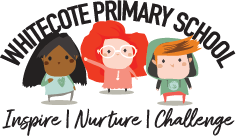English
English at Whitecote Primary School
At Whitecote Primary School we follow 'The National Curriculum in England, Key Stages 1 and 2 Framework Document' which has the following aims:
The overarching aim for English in the national curriculum is to promote high standards of language and literacy by equipping pupils with a strong command of the spoken and written word, and to develop their love of literature through widespread reading for enjoyment. The national curriculum for English aims to ensure that all pupils:
- read easily, fluently and with good understanding
- develop the habit of reading widely and often, for both pleasure and information
- acquire a wide vocabulary, an understanding of grammar and knowledge of linguistic conventions for reading, writing and spoken language
- appreciate our rich and varied literary heritage
- write clearly, accurately and coherently, adapting their language and style in and for a
- range of contexts, purposes and audiences
- use discussion in order to learn; they should be able to elaborate and explain clearly their understanding and ideas
- are competent in the arts of speaking and listening, making formal presentations, demonstrating to others and participating in debate.
This is taught through the areas of spoken language, reading and writing (including vocabulary, grammar, punctuation and spelling). We include an emphasis on phonics for reading and spelling in the Early Years and Key Stage 1, culminating in Year 1 children taking the Phonics Screening Check in the Summer Term.
Reading
We use a mixture of reading schemes for individual and guided reading - to ensure children become familiar with a range of different books, including short stories, longer novels, non-fiction and poetry. These include Oxford Reading Tree, Rigby Navigator, Cambridge, Oxford Fireflies, Pocket Tales (Rigby) and Badger Guided Reading. In addition, we have two well-stocked libraries containing a mixture of picture books, classic and popular novels and non-fiction books on a range of different topics. Recent book purchases include the works of David Walliams and extra copies of 'Diary of a Young Girl' by Anne Frank - at the request of some Year 6 children
Phonics
Children in the Foundation Stage and Key Stage One follow the 'Floppy's Phonics' synthetic phonics programme. In Nursery children look at environmental sounds, alliteration and rhyme, creating sounds with instruments and discriminating between sounds. In Reception children begin to learn sounds from the alphabetic code, building up a bank of sound knowledge moving into Year 1 and in preparation for the Phonics Screening Check. Children consolidate their learning and move into alternative spellings of sounds using different pieces of code in Year 2. Children participate in discrete daily phonics sessions mainly as a whole class throughout Reception, Year 1 and Year 2, with some children continuing to access these or small group phonics interventions in Key Stage Two. Session plans and interactive lesson resources from 'Oxford Owls' support the delivery of 'Floppy's Phonics' and texts from the Oxford Reading Tree schemes are used to consolidate children's learning and put into practise their segmenting and blending skills to read. We also have a range of phonics reading books in school including Oxford Songbirds, Rigby Star Phonics, Dandelion Readers and Jelly and Bean to match the children's phonic knowledge and skills set. Children embed their learning of the letter sounds through purposeful worksheets that combine letter and sound correspondence, reading, spelling and handwriting. These sheets will be sent home each week so that the children can share their learning at home and have the opportunity for an extra practise.
